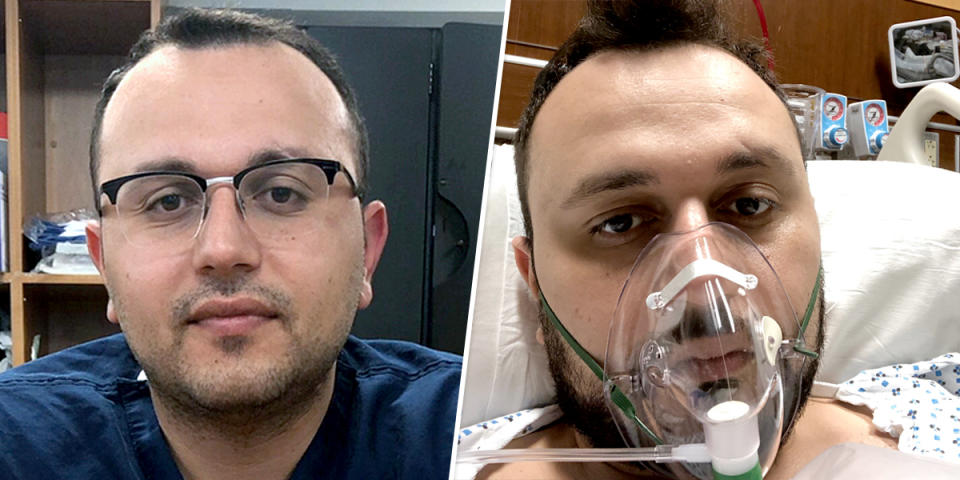Many nurses were hospitalized with Covid early in the pandemic
Most health care workers who were hospitalized with Covid-19 early in the pandemic had had direct interactions with patients, according to a report published Monday by the Centers for Disease Control and Prevention.
The report, which focused on Covid-19-related hospitalizations among health care workers from March through May, found that 67 percent were in roles with patient contact. More than one third were nurses.
Full coverage of the coronavirus outbreak
"Nurses have the most direct — and the most prolonged — contact with patients," said Dr. William Schaffner, an infectious disease expert at Vanderbilt University Medical Center and a co-author of the new report.
Though it's unclear from the report precisely how health care workers were exposed to Covid-19 — it is possible that they got sick in the community — nurses' work environments in particular increase their risk.
Since the beginning of the pandemic, 189,011 health care workers in the U.S. have been diagnosed with Covid-19, and 767 have died.
The new report from the CDC zeroes in on a subset of those infections: health care workers who were sick enough to be hospitalized. The analysis is not a comprehensive look at national data; rather, it is based on 13 states for which such data was available from the first three months of the outbreak in the U.S.
Among 438 hospitalized health care workers during that time, nearly 72 percent were female. More than half were Black. The report found 28 percent were admitted to the ICU, nearly 16 percent were put on a ventilator, and 4 percent died.
The vast majority — 89.9 percent — had an underlying health condition, such as obesity, high blood pressure or diabetes. That is in line with previous research on hospitalized Covid-19 patients, which found 90 percent had at least one other comorbidity.

But underlying health conditions do not account for all health care workers hospitalized with Covid-19.
Dr. Anar Yukhayev was an otherwise healthy 31-year-old OB/GYN at Long Island Jewish Medical Center in New York when he became infected with the coronavirus.
While it's unclear how he was exposed, Yukhayev recalls an appointment with a patient in early March. About 30 minutes into visit, the woman mentioned she'd recently been sick after returning from a trip to Italy.
"At that point, I put a mask on myself and on the patient," Yukhayev recalled. "But it was probably too late."
Within a week, Yukhayev developed a fever, headaches and nausea. When his oxygen levels dipped, he was admitted to the hospital, where he needed supplemental oxygen to help him breathe.
"I was so exhausted. I felt like I was drowning," Yukhayev said.
It's likely that health care workers like Yukhayev were more exposed to Covid-19 in the spring than they are now. Early in the pandemic, the virus was spreading undetected in many areas of the country and many hospitals reported shortages of personal protective equipment, such as N-95 masks.
Download the NBC News app for full coverage of the coronavirus outbreak
On Monday, the World Health Organization made clear that health care workers deserve continued support.
"In March, health workers were routinely applauded for the personal sacrifice they were making to save lives," tweeted WHO director-general Tedros Adhanom Ghebreyesus. "Many of those #HealthWorkers, who have themselves gone through immense stress & trauma, are still on the frontlines, facing a fresh wave of new patients."
Indeed, Schaffner said, there can be no doubt that health care workers are tired and are suffering from mental health strains.
"Health care teams remain extraordinarily dedicated. They're wonderful professionals," Schaffner said. "But they're all anxious about the coming winter with both Covid-19 and flu."
"They're tightening their seat belts, thinking, 'Oh my goodness, it could get worse.'"

